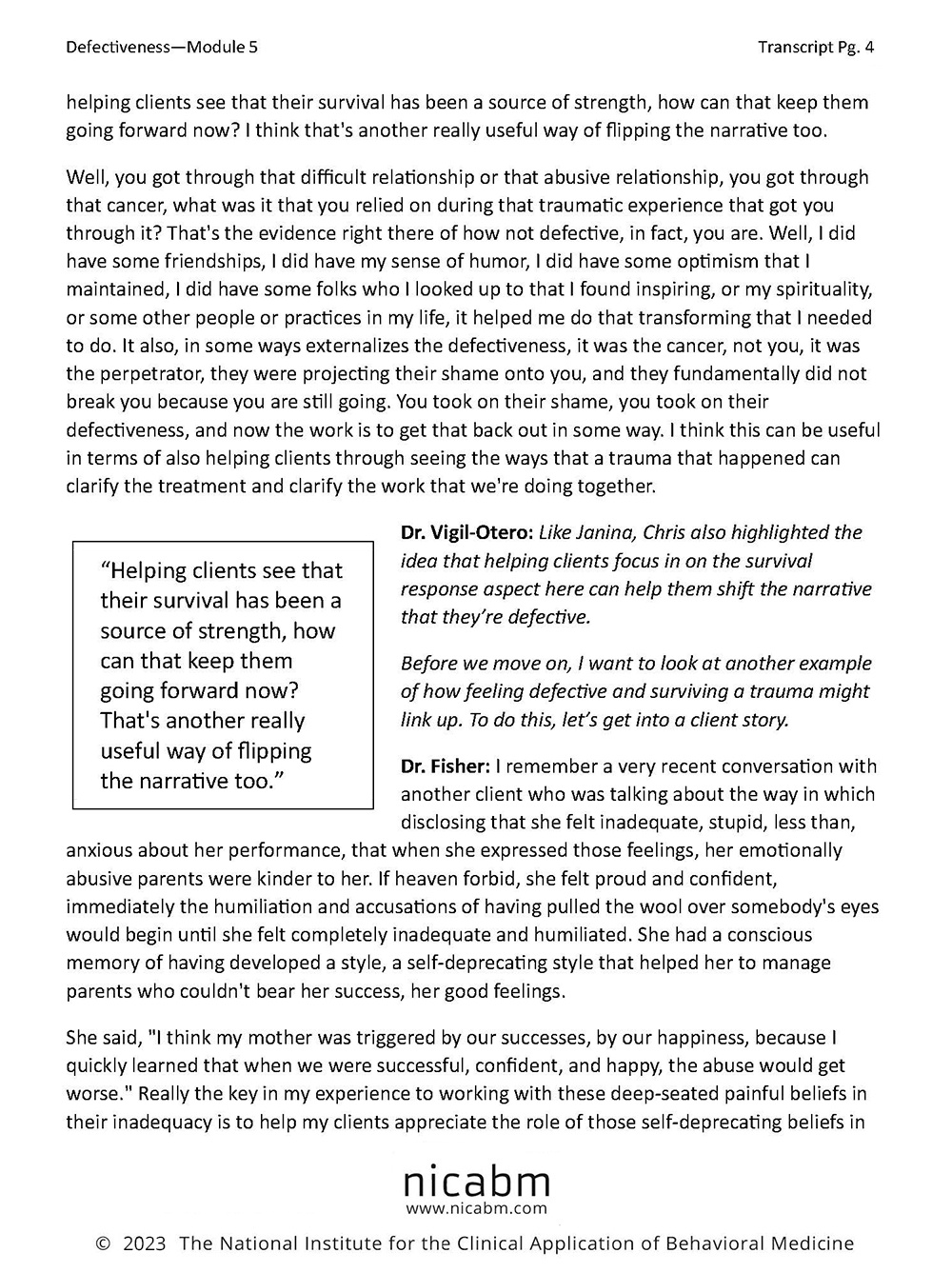How to Work with a Client’s Core Feeling of Defectiveness
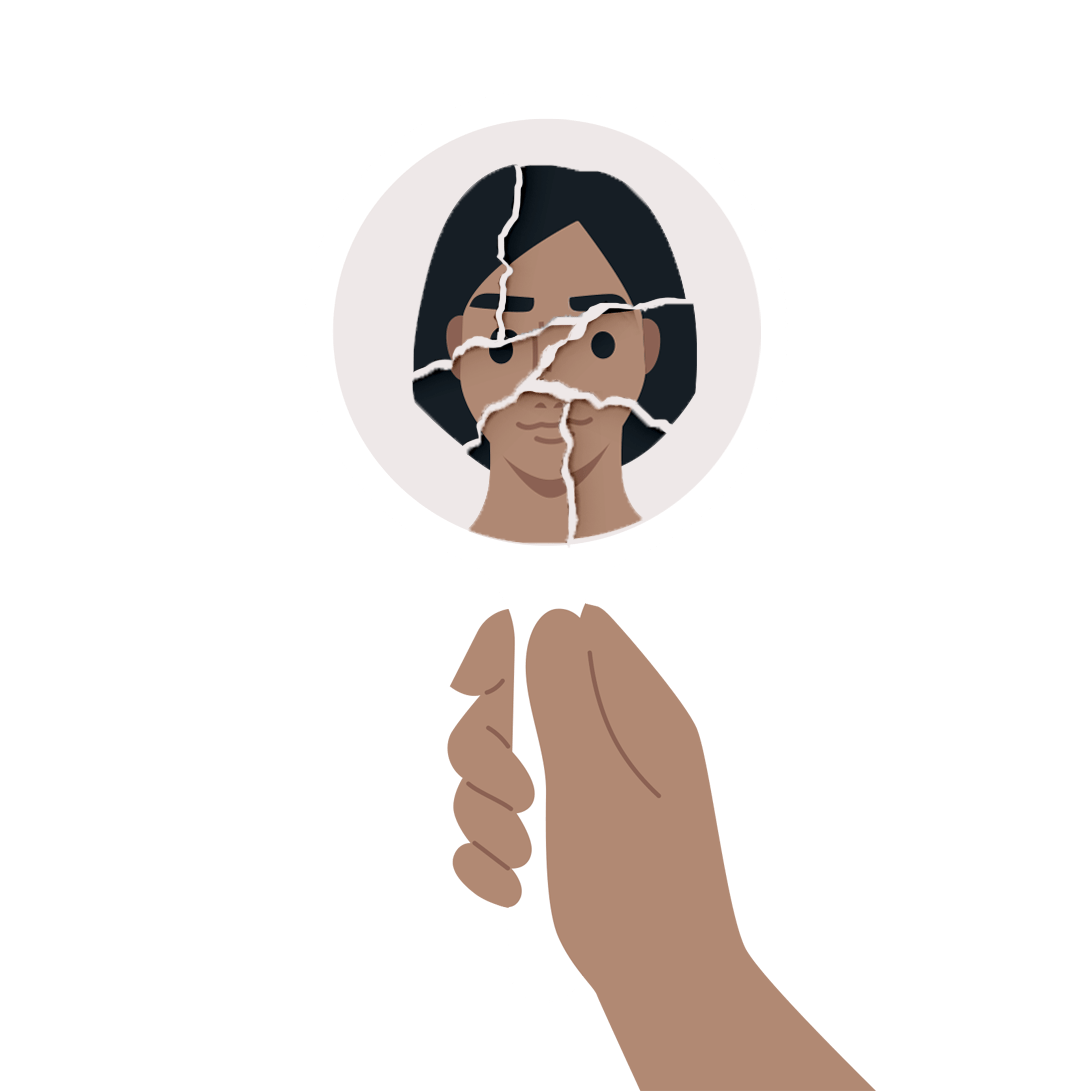
 For some clients, there’s a core belief that underlies many of the clinical issues they bring to therapy – a sense of defectiveness.
For some clients, there’s a core belief that underlies many of the clinical issues they bring to therapy – a sense of defectiveness.
When a client feels defective, they’re often plagued by shame and self-doubt.
It can leave them feeling like they’re unworthy of change (which is why we often see self-sabotage and regression).
To add to the problem, these entrenched beliefs usually can’t be touched by reason or logic alone . . .
. . . and for many clients, each failed attempt to shift feelings of defectiveness often only amplifies their intensity.
So how can we overcome these therapeutic obstacles and help clients break free of a painful core belief that they’re fundamentally flawed?
We brought this question to 18 of the top minds in the field. Presenting . . .
How to Work with Feelings of Defectiveness

How to Work with Trauma-Fueled Feelings of Defectiveness
Janina Fisher, PhD Terry Real, LICSW Eboni Webb, PsyD
Frank Anderson, MD Zindel Segal, PhD Dennis Tirch, PhD
Chris Willard, PsyD
- Two Specific Ways to Recognize Trauma-Based Feelings of Defectiveness
- How to Address Feelings of Defectiveness Tied to a Client’s Trauma Narrative
- A Parts Approach to Help Clients Externalize and Distance Themselves from Feelings of Defectiveness
- One Strategy to Skillfully Attune to a Client’s Trauma-Based Feelings of Defectiveness

How to Work with Feelings of Defectiveness That Stem From Attachment Disturbances
Terry Real, LICSW Eboni Webb, PsyD
Joan Borysenko, PhD Deany Laliotis, LICSW Chris Willard, PsyD
- One Attachment Style That’s Disproportionately Associated with Feelings of Defectiveness (and How to Work with It)
- Strategies to Help Clients Begin to Cultivate Self-Compassion and Develop Secure Attachment
- Steps to Help Clients Better Understand the Childhood Origins of Their Feelings of Defectiveness

How to Shift Cognitive Patterns That Reinforce Feelings of Defectiveness
Frank Anderson, MD Michael Yapko, PhD
Lynn Lyons, LICSW Zindel Segal, PhD
- One Specific Cognitive Style That Often Fuels Feelings of Defectiveness
- A Parts Approach That Can Help Shift Defective Thoughts
- Specific Questions To Ask Clients Who Struggle with an All-Encompassing Sense of Defectiveness
- How to Approach the Underlying Factors That May Influence a Client’s Sense of Defectiveness

Practices That Can Counteract and Diminish Feelings of Defectiveness
Dennis Tirch, PhD Russell Kolts, PhD
Zindel Segal, PhD Chris Willard, PsyD
- A Three-Step Process to Help Clients Develop Self-Compassion
- How to Skillfully Introduce New Ideas to Clients Whose Feelings of Defectiveness Spur Resistance to Change
- Specific Mindfulness Practices That Can Help Shift a Client’s Relationship with Feelings of Defectiveness
- Strategies to Ease Critical Thoughts and Help Boost a Client’s Self-Worth

Strategies to Help Clients Dislodge Persistent Feelings of Defectiveness
Janina Fisher, PhD Ellyn Bader, PhD George Faller, MS, LMFT
Chris Willard, PsyD Christine Padesky, PhD Michael Yapko, PhD
Russell Kolts, PhD Lynn Lyons, LICSW
- A Three-Step Process to Help Clients Lean Into the Potential for Change
- Two Ways to Challenge a Client’s Narrative of Defectiveness
- One Critical Choice Clients Have to Make to Shed Feelings of Defectiveness (and How to Help Guide Them Through It)
- A Simple Exercise That Can Increase a Client’s Awareness of Damaging Self-Talk

How to Overcome the Unique Challenges of Treating Feelings of Defectiveness
Christine Padesky, PhD Russell Kolts, PhD George Faller, MS, LMFT
Frank Anderson, MD Lynn Lyons, LICSW Janina Fisher, PhD
Kelly Wilson, PhD Chris Willard, PsyD
- One Oversight That Can Decrease the Effectiveness of Interventions with Clients Who Feel Defective
- Six Common Blocks That Can Arise When Treating Feelings of Defectiveness (and How to Work Around Them)
- A Potential False Start to Avoid When a Client Presents with Feelings of Defectiveness (and Where to Start Instead)
- One Common Misconception About Feelings of Defectiveness That Can Lead Treatment Awry

The Impact of Feelings of Defectiveness on a Client’s Relationships (and How to Work with It)
Usha Tummala-Narra, PhD Kelly Wilson, PhD Joan Borysenko, PhD
Chris Willard, PsyD George Faller, MS, LMFT Ellyn Bader, PhD
Russell Kolts, PhD
- Five Specific Ways Feelings Defective Can Impact Relationships (and How to Address Them)
- A Three-Step Strategy to Help Clients Who Feel Defective Repair Ruptures (and Potentially Prevent Future Ones)
- Practical Exercises to Help Clients Better Support Partners Who Feel Defective
Register Here for $197
You’ll get all the videos, audios, transcripts, and learning tools
to help you work with clients who struggle with persistent feelings of defectiveness
Sign Me Up
Up to 9 CE/CME Credits or Clock Hours are available for purchase at checkout.
Click HERE to get information about CE/CME credits and clock hours as well as speaker disclosures
You Are Protected By
NICABM’s Money-Back Guarantee
We invite you to register for this training program without any risk. Unless you are completely satisfied, we will refund your money. Just let us know within 30 days from the date of registration. We are that confident that you will find this information to be more than you expected.
For This Short Course, We Brought Together Some of the Top Experts in the Field

Janina Fisher, PhD
Licensed clinical psychologist and Instructor at the Trauma Center, an outpatient clinic and research center founded by Bessel van der Kolk, MD; past president of the New England Society for the Treatment of Trauma and Dissociation.

Terry Real, MSW, LICSW
Founder of the Relational Life Institute; Author of I Don’t Want to Talk About It: Overcoming the Secret Legacy of Male Depression and The New Rules of Marriage: What You Need to Make Love Work.
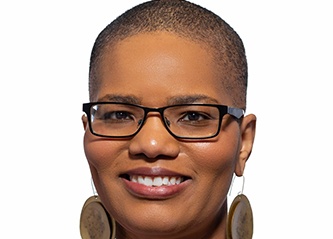
Eboni Webb, PsyD
Licensed psychologist; specializes in DBT for trauma-based disorders and co-occurring disorders; advisor to the DBT National Certification Accreditation Association.

Kelly Wilson, PhD
Co-author of Acceptance and Commitment Therapy: An Experiential Approach to Behavior Change; Founder of OneLife Education Training, LLC.

Frank Anderson, MD
Licensed psychiatrist and psychotherapist; program consultant for the IFS Institute; advisor to the International Association of Trauma Professionals; author of Transcending Trauma: Healing Complex PTSD with Internal Family Systems.

Usha Tummala-Narra, PhD
Professor of Counseling, Developmental, and Educational Psychology at Boston College; Author of Psychoanalytic Theory and Cultural Competence in Psychotherapy; Co-author of Applying Multiculturalism: An Ecological Approach to the Multicultural Guidelines.

Deany Laliotis, LICSW
Director of Training at EMDR Institute; Specialist in treatment of traumatic stress disorders and attachment issues; author of chapters and articles on EMDR therapy.

Christine Padesky, PhD
Co-founder of the Center for Cognitive Therapy in Huntington Beach, California; Co-creator of Strengths-Based CBT; Co-author of Mind Over Mood and Collaborative Case Conceptualization.
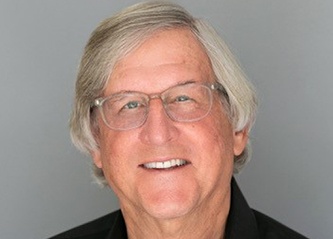
Michael Yapko, PhD
Leading expert in clinical hypnosis and treating depression; Clinical psychologist and author of 15 books including his newest books, The Discriminating Therapist and Keys to Unlocking Depression.

Joan Borysenko, PhD
Founder of Mind/Body Health Sciences LLC; Author of New York Times Bestseller Minding the Body, Mending the Mind.

Ellyn Bader, PhD
Co-creator of The Developmental Model of Couples Therapy; Co-director of The Couples Institute.

Lynn Lyons, LICSW
Author of Anxious Kids, Anxious Parents: 7 Ways to Stop the Worry Cycle and Raise Courageous & Independent Children, clinical social worker and psychotherapist specializing in anxiety in adults and children.

Dennis Tirch, PhD
Founding Director of The Center for Compassion Focused Therapy; President of The Compassionate Mind Foundation of North America; co-author of Experiencing ACT from the Inside Out: A Self-Practice/Self-Reflection Workbook for Therapists.
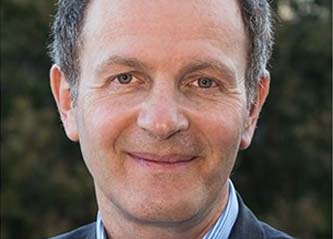
Zindel Segal, PhD
A founder of Mindfulness-Based Cognitive Therapy (MBCT); Professor of Psychology at the University of Toronto.

Ron Siegel, PsyD
Assistant Professor of Psychology, part time, Harvard Medical School; Author of The Mindfulness Solution: Everyday Practices for Everyday Problems and Sitting Together: Essential Skills for Mindfulness-Based Psychotherapy.
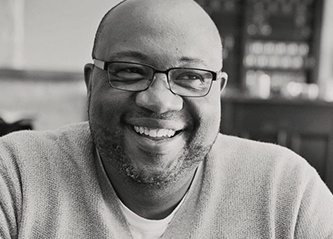
Elliott Connie, MA, LPC
Licensed psychotherapist; founder and Director of The Solution Focused University; co-author of The Art of Solution Focused Therapy.

Christopher Willard, PsyD
Psychologist and educational consultant specializing in mindfulness; president of the Mindfulness in Education Network; serves on the board of directors at the Institute for Meditation and Psychotherapy.

Russell Kolts, PhD
Clinical psychologist and professor of psychology at Eastern Washington University; Founder and Director of the Inland Northwest Compassionate Mind Center; author of The Compassionate Mind Approach to Managing Your Anger.

George Faller, MS, LMFT
Licensed marriage and family therapist; founder and President of the New York Center for EFT; retired Lieutenant of the NYC Fire Department.
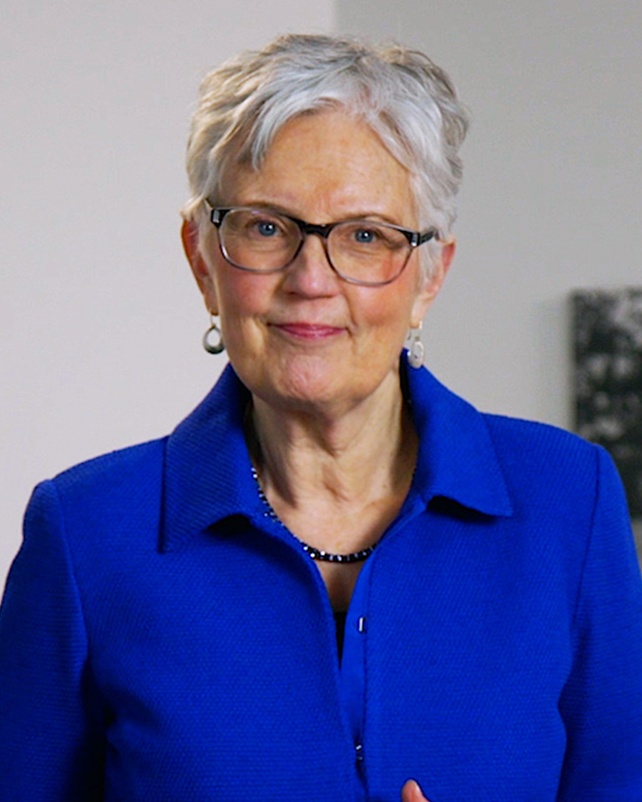
Course Director
Ruth Buczynski, PhD

Program Co-Host
Ashley Vigil-Otero, PsyD
Here's What You'll Get:
Everything is yours to keep forever in your professional library
|
|
Downloadable videos of all 8 modules so you can watch at your convenience, on any device |
|
|
Audio recordings you can download and listen to at home, in the car, at the gym or wherever you like |
|
|
Critical Insights sessions to distill key ideas (this is where we “land” the session) |
|
|
Focus on Application sessions to give you concrete strategies to use with your clients |
|
|
Professionally-formatted transcripts of the sessions, to make review and action simple |
Get a Special Bonus Session That Gives You Even More Strategies for Working with a Client’s Feelings of Defectiveness

How to Interrupt the Intergenerational Transmission of Feelings of Defectiveness
Usha Tummala-Narra, PhD Michael Yapko, PhD
Zindel Segal, PhD Chris Willard, PsyD George Faller, MS, LMFT
- Strategies to Target Internalized Messages That Perpetuate Feelings of Defectiveness
- How to Shift Feelings of Defectiveness That are Rooted in a Client’s Family of Origin
Plus, All 9 Modules Come with Practical Tools to Help You Take Action Immediately and Effectively
Synthesize Key Concepts So You Can Use Them Immediately
Ron Siegel, PsyD and Usha Tummala-Narra, PhD sit down with Ruth Buczynski, PhD for 8 Critical Insights sessions to dig more deeply into the ideas from each module. They’ll clarify critical concepts and break down key strategies so you can gain confidence in your understanding.

Discover Concrete Practices That Will Work for Your Patients
Over the course of 8 Focus on Application sessions, we’ll turn smart ideas into easy-to-integrate applications for your work. Eboni Webb, PsyD and Chris Willard, PsyD join Ashley Vigil-Otero, PsyD to give you specific practices and exercises based on the ideas from each module. You’ll get strategies you can use with your clients as soon as your very next session.

Register Here for $197
You’ll get all the videos, audios, transcripts, and learning tools
to help you work with clients who struggle with persistent feelings of defectiveness
Sign Me Up
Up to 9 CE/CME Credits or Clock Hours are available for purchase at checkout.
Click HERE to get information about CE/CME credits and clock hours as well as speaker disclosures
You Are Protected By
NICABM’s Money-Back Guarantee
We invite you to register for this training program without any risk. Unless you are completely satisfied, we will refund your money. Just let us know within 30 days from the date of registration. We are that confident that you will find this information to be more than you expected.
Here's What Your Peers Have Experienced In NICABM Programs

. . . I feel so fortunate to have this access to brain power, experience and research synthesis . . .
“When I listen to the experts talk openly about their experience, I feel so fortunate to have this access to brain power, experience and research synthesis on cutting edge issues! I go back to the videos to reinforce things that will assist my clients.”
Mary Logan, Counselor
Ipswich, MA

I benefit, my practice benefits, and most important my clients benefit . . .
“I live in Nova Scotia and have limited travel funds at the university at which I work. The series provided by NICABM gives me the rare opportunity to listen to the leaders in the field. As a result, I learn valuable information that would not otherwise be available to me. I benefit, my practice benefits, and most important my clients benefit from the knowledge and wisdom I gain from the series.”
David Mensink, PhD Counseling Psychology, Psychologist
Halifax, Nova Scotia, Canada

. . . some dare to go the extra journey to research and educate
“These NICABM series keep me afloat, in touch, on track, well trained in my field, and more personally healthy. The best aspect, though, is that I feel validated and comforted knowing that some dare to go the extra journey to research and educate, so I can walk the path to health, and can share with others.”
Mary Corsello-Vilcheck, LCSW
Midlothian, VA
Why the Transcript Is Essential:
- The transcript makes it easy to go back and double check concepts, citations and names that are mentioned
- We put in a table of contents to make it easy for you to find the exact part of the webinar you need
- Having the concepts already written allows you to take notes on how you’re going to use the ideas rather than transcribing the ideas
- Some people simply learn better by reading than by listening or watching
- You will be able to print out and share techniques presented in the session with your patients

“I really liked being able to follow along with the transcripts as I listened…it was nice not to feel like I had to take notes. I really feel like I remember more when I both hear and see at the same time.”
Mary Ellen McNaughton, Masters in Counseling, Psychology Counselor
Kelowna, British Colombia, Canada
You Are Protected By
NICABM’s Money-Back Guarantee
We invite you to register for this training program without any risk. Unless you are completely satisfied, we will refund your money. Just let us know within 30 days from the date of registration. We are that confident that you will find this information to be more than you expected.
Register Here for $197
You’ll get all the videos, audios, transcripts, and learning tools
to help you work with clients who struggle with persistent feelings of defectiveness
Sign Me Up
Up to 9 CE/CME Credits or Clock Hours are available for purchase at checkout.
Click HERE to get information about CE/CME credits and clock hours as well as speaker disclosures
